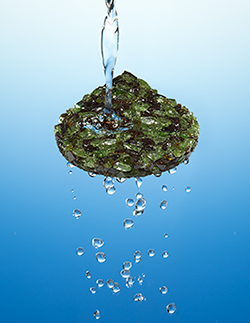- Freeze/thaw cycles and hot climate performance & durability?
- How do I manage snow removal?
- What about clogging?
- What goes under FILTERPAVE?
- Maintenance requirements?
- Where can FILTERPAVE be used?
- Possible contributions to LEED® projects?
- How is it installed?
- How much does FILTERPAVE cost?
Q: Freeze/thaw/heat affect?
A: The FILTERPAVE Porous Pavement system is flexible, durable, and resistant to freeze-thaw cycles and has been installed successfully in cold climates such as Wisconsin and Canada.
With all pervious paving systems, it is important to have a site specific, open graded infiltration base designed for stormwater storage. This base area is typically made of rock with approx. 40% void ratio that can accept the expansion of water to ice (approx. 15%) without any damage to the pavement.
FILTERPAVE has been successfully installed in very hot climates such as Phoenix AZ. The BASF Elastomeric Polyurethane binderused in FILTERPAVE is stable under a very wide range of temperatures.
« Back to top
Q: Considerations for snow removal?
A: FILTERPAVE should be plowed using a polycarbonate type-cutting blade mounted to a traditional truck mounted plow. Shovels and snow blowers can be used as normally done on other pavements. Typical pervious paving require less than 50% of the salt and other de-icing materials as traditional dense pavements.
« Back to top
Q: What about clogging?
A: FILTERPAVE has over twice the sustainable void space as other hard-surfaced pervious pavements, resulting in less clogging and greater reduction of stormwater runoff.
The porosity of FILTERPAVE was determined to be 39%, which is the amount of storage within the material. The table below provides the sustainable void space values (porosity) for pervious pavements tested at UCF after rejuvenation. These results:
| POROUS PAVEMENT | SUSTAINABLE VOID SPACE % 1 |
| FILTERPAVE – Glass Series |
39 |
| FILTERPAVE – Stone Series | 47 |
| Pervious Concrete | 20 |
| Porous Asphalt | N/A |
| Flexipave® | 18 |
| Pavers | 10 |
1 Per Stormwater Management Academy at UCF, Pervious Pavement Water Management Analysis Model.
FILTERPAVE system is twice as pervious as pervious concrete & has more sustainable void space than any other porous pavement.
Q: What goes under FILTERPAVE?
A: All projects require a geotechnical evaluation of the permeability of the underlying native soils. With this information and the design stormwater requirements, an open graded base layer constructed of clean, washed rock or recycled concrete are used at in various depths to provide the appropriate amount of stormwater storage / structural base to both infiltrate water and support the pavement.
« Back to top
Q: What are the maintenance requirements?
A: As with all pervious pavements, FILTERPAVE should be keep free of large sediment loads. Annual rejuvenation of the permeability should be done by use of a water flush and vac-truck treatment.
No porous pavement on the market has a larger sustainable void space but, in order to keep these voids operational – flushing and vacuum cleaning is recommended.
A UV stabilizing topcoat should be applied periodically (every 3-5 years, with exceptions) to protect the surface from fading and shedding.
« Back to top
Q: Where can FILTERPAVE be installed?
A: FILTERPAVE can be used in the following areas:
- Parking Areas
- Golf Cart Pathways
- Trails/ Walkways
- Sidewalks
- Driveways
- Pedestrian Plazas
- Boat Ramp Landings
FILTERPAVE in a LEED® project is a perfect match.
Using FILTERPAVE porous paving in your design or project can help you earn LEED ® points in the following categories:
- Reduced Site Disturbance
- Stormwater Quality and Quantity
- Control Heat Island Effect
- Recycled Material Content
Q: How is FILTERPAVE installed and can I do it?
A: The system is installed by Certified Contractors, experienced in the application of specialty pavements. For a Contractor, contact us today.
« Back to top
Q: How much does FILTERPAVE cost?
A: All projects costs are site specific due to the base design, application-type and project location. To receive a budgetary estimate or firm quote, contact us.
« Back to top
